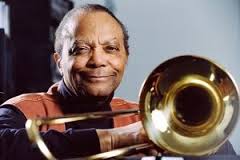J.J. Johnson
January 22, 1924 – February 4, 2001
| Instrument | trombone |
| Birthplace | Indianapolis, IN |
Available Leadsheets
- Commutation - J.J. Johnson Swing (medium up)
- Coppin' The Bop - J.J. Johnson Swing (medium)
- Cube Steak - J.J. Johnson Swing (uptempo)
- Enigma - J.J. Johnson Ballad
- Naptown U.S.A. - J.J. Johnson Swing (medium up)
- NWPT - J.J. Johnson Swing (medium up)
- Say When - J.J. Johnson Swing (medium up)
- Short-Cake - J.J. Johnson Swing (medium up)
- Tromboniums In Motion - J.J. Johnson Swing (medium)
- Why Indianapolis, Why Not Indianapolis? - J.J. Johnson Swing (medium up)

J.J. Johnson is arguably the most influential bop and post-swing trombonist and also one of the great composers and arrangers in jazz. He was one of the first trombonists to embrace bebop; his playing continues to exert a strong influence on other musicians. He started his recording career in 1942 in Benny Carter's big band. On July 2, 1944, J.J was on the first Jazz At The Philharmonic concert. He recorded with the Count Basie Orchestra beginning in 1945.
He made his first recording as a leader on June 26, 1946, for Savoy Records ("Mad Be Bop"/Jay Jay Johnson's BeBoppers). In 1946 he also recorded with Dizzy Gillespie for the first time (another Jazz At The Philharmonic), and then continued to play and record in Dizzy's small bands as well as Dizzy's big band, while also playing and recording with Coleman Hawkins, Charlie Parker, Leo Parker, Fats Navarro, Kenny Dorham and nearly all the other musicians who were making their names on New York City's 52nd Street.
The Lord discography lists 102 sessions as a leader, with albums on practically all the major labels of the late '40s through the '60s: Savoy, New Jazz, Fantasy, Prestige, Blue Note, Columbia, Verve, RCA and Impulse. Not to mention his recordings as a co-leader, with Kai Winding, for example (Jay & Kai).
From the mid-fifties, but especially the early sixties on, J.J. dedicated more and more time to composition. In 1970, Quincy Jones convinced him to move from New York to California to compose for cinema and television, where he eventually scored movies such as "Across 110th Street" and "Cleopatra Jones" as well as TV shows such as "Starsky & Hutch," "Mike Hammer" and others.
In 1987, J.J. returned to his home town of Indianapolis and reactivated his playing career. He started recording again in 1988 with his own quintet which featured our own Renee Rosnes (piano) and Victor Lewis on drums. Except for one 1990 session for Concord, J.J. stayed in the Verve family for his last three albums as a leader; jazzleadsheets.com's Don Sickler serving as co-producer, conductor and even performer.
